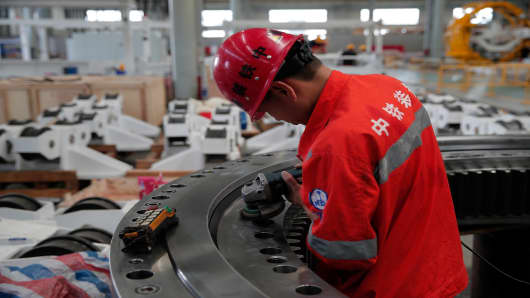Slowing growth in China is a good thing, according to Anthony Cragg, portfolio manager at Wells Fargo Asset Management, who said that most of the country's "so-called problems" provided opportunities for investors.
Cragg, who manages an emerging markets income and growth fund and a Chinese equity fund, said it would be a mistake to underestimate the world's second largest economy.
"Clearly we're seeing lower growth … I think that's a good thing, rather than the explosive, rampant growth we had in past," he told CNBC on Tuesday.
"It has been wrong to underestimate China. The new administration is quite dynamic. They're addressing corruption and austerity – and these in the long term are healthy developments for China. Short-term, it will put people off the market a little bit."
(Read More: Things Are Looking Bad Outside China, Too)
Concerns about the strength of China's economy were stoked on Monday, as the HSBC/Markit Purchasing Managers' Index (PMI) revealed that manufacturing contracted for the first time in seven months in May. Last week, the International Monetary Fund cut its 2013 growth outlook for China from 8 percent to 7.75 percent.
But Cragg argued that investors should see the country's perceived troubles in a positive light.
"A number of things that are pointed to as being so-called problems for China are actually opportunities," he said. The environmental degradation of the country, for instance, meant that stocks in the green sector – like waste treatment, clean water and efficient technology stocks - were doing very well.
"Another one is the aging demographic as a result of the one-child policy. That is gradually being relaxed… You'll have a fairly serious baby boom coming up in China and that throws up all sorts of opportunities for baby-facing companies," he added.
(Read More: Warning: 'Prepare' for Commodity Supercycle End)
Cragg, whose emerging market income and growth fund is up by around 5 percent, said the returns on his fund had been from secondary markets, not the larger economies of Brazil, Russia, India, China and South Africa (BRICS), which are all down year-to-date.
"At some point those other ones (BRICS) will kick in," he said, adding that although there are reasons to be cautious on Russia and South Africa, China is a good example of the potential in emerging markets.
"It's gone from one of the most expensive emerging markets to one of the cheapest …I think that a lot of the negatives you hear about are priced in," he said.
He acknowledged that emerging markets were currently going through a "rough time", given the uncertainty surrounding the tapering of monetary stimulus by the Federal Reserve.
U.S. officials are discussing when to scale back the Fed's asset purchases, and speculation about imminent tapering has led to global stock market volatility over recent weeks.
But Cragg said these concerns were too short-term. "I've been investing in emerging markets for more than 30 years, I try to think a little bit further than the end of tomorrow, and we are extremely positive on the longer term on emerging markets."
(Read More: BRIC Powerhouses Risk 'Middle-Income Growth Trap')
-- By CNBC's Katrina Bishop. Follow her on Twitter @KatrinaBishop



